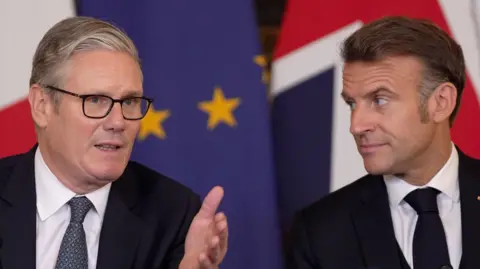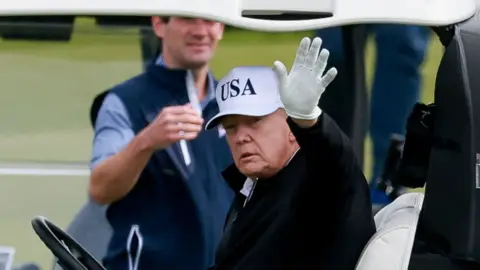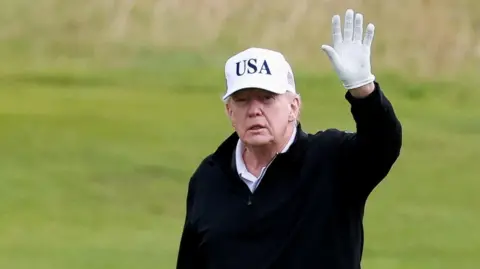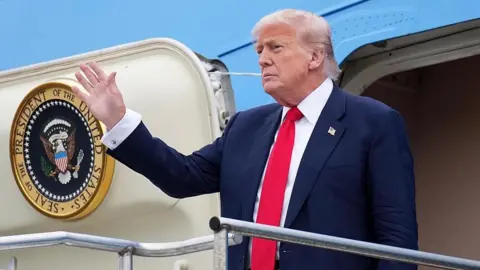Starmer to Recognize Palestine? UK's Risky Gamble
Will Britain Follow France's Bold Gamble on Palestinian Statehood?
**A seismic shift is underway in the Middle East.** France, a key player on the world stage, just announced its intention to recognize a Palestinian state. This isn't just another diplomatic maneuver; it's a high-stakes gamble that puts immense pressure on the UK to follow suit. But will they? And what will this mean for peace in the region? Read on to discover the untold story.
 Macron's Daring Move: A Calculated Risk?
President Emmanuel Macron's dramatic announcement at the UN General Assembly in September is more than just a symbolic gesture. It’s a calculated attempt to inject much-needed momentum into the stalled peace process. He envisions a domino effect, with other nations falling in line behind France and the UK – two permanent members of the UN Security Council (UNSC). A senior French diplomat explained, "Two parent UNSC members acting together shows we mean business!"
Macron's Daring Move: A Calculated Risk?
President Emmanuel Macron's dramatic announcement at the UN General Assembly in September is more than just a symbolic gesture. It’s a calculated attempt to inject much-needed momentum into the stalled peace process. He envisions a domino effect, with other nations falling in line behind France and the UK – two permanent members of the UN Security Council (UNSC). A senior French diplomat explained, "Two parent UNSC members acting together shows we mean business!"
 This bold strategy, however, is a risky one. The US, China, and Russia, along with ten rotating UNSC members, hold differing views. The success hinges heavily on whether the UK, traditionally hesitant on this issue, will join forces.
Will this unprecedented pressure force the UK's hand? The answer could reshape the geopolitical landscape.
This bold strategy, however, is a risky one. The US, China, and Russia, along with ten rotating UNSC members, hold differing views. The success hinges heavily on whether the UK, traditionally hesitant on this issue, will join forces.
Will this unprecedented pressure force the UK's hand? The answer could reshape the geopolitical landscape.
 The UK's Tightrope Walk: Tradition vs. Pressure
The UK government has long walked a cautious tightrope on Palestinian statehood. Officials have voiced concerns about "gesture politics," arguing that recognition should be part of a broader, long-term political settlement—a powerful lever to secure a lasting peace agreement. They fear upsetting key allies like the US and Israel, who view recognition as rewarding terrorism.
The UK's Tightrope Walk: Tradition vs. Pressure
The UK government has long walked a cautious tightrope on Palestinian statehood. Officials have voiced concerns about "gesture politics," arguing that recognition should be part of a broader, long-term political settlement—a powerful lever to secure a lasting peace agreement. They fear upsetting key allies like the US and Israel, who view recognition as rewarding terrorism.
 Furthermore, concerns over the Palestinian Authority's reforms have also added to the UK’s hesitation. Prime Minister Rishi Sunak's statement emphasizing a ceasefire as a prerequisite for recognition reflects this cautious approach. Foreign Secretary David Lammy reiterated this stance, highlighting that recognition is a symbolic act, not a magic bullet for a two-state solution.
But the political pressure is mounting. Will the UK hold firm, or will the tide of public and parliamentary opinion force a change?
Furthermore, concerns over the Palestinian Authority's reforms have also added to the UK’s hesitation. Prime Minister Rishi Sunak's statement emphasizing a ceasefire as a prerequisite for recognition reflects this cautious approach. Foreign Secretary David Lammy reiterated this stance, highlighting that recognition is a symbolic act, not a magic bullet for a two-state solution.
But the political pressure is mounting. Will the UK hold firm, or will the tide of public and parliamentary opinion force a change?
 A Parliamentary Showdown Looms?
The UK's political landscape is heating up. Backbench MPs are demanding action, drafting joint letters to Downing Street and urging the government to recognize Palestine. The Foreign Affairs Committee has issued a supportive report, and even cabinet ministers like Wes Streeting have voiced their support, expressing concern that there may soon be "no state of Palestine left to recognize."
A Parliamentary Showdown Looms?
The UK's political landscape is heating up. Backbench MPs are demanding action, drafting joint letters to Downing Street and urging the government to recognize Palestine. The Foreign Affairs Committee has issued a supportive report, and even cabinet ministers like Wes Streeting have voiced their support, expressing concern that there may soon be "no state of Palestine left to recognize."
 This internal pressure, coupled with France’s bold move, has transformed the issue from a diplomatic debate into a potential political crisis. Failure to follow France's lead could lead to significant votes and rebellions within Parliament – a scenario that might rival recent welfare reform debates in intensity. The alternative – a reluctant, strategically ineffective recognition – is equally troubling.
What's Next? A Crossroads for Peace
This internal pressure, coupled with France’s bold move, has transformed the issue from a diplomatic debate into a potential political crisis. Failure to follow France's lead could lead to significant votes and rebellions within Parliament – a scenario that might rival recent welfare reform debates in intensity. The alternative – a reluctant, strategically ineffective recognition – is equally troubling.
What's Next? A Crossroads for Peace
 Over 140 countries already recognize Palestine. Recent recognitions by countries like Ireland and Spain haven't dramatically altered the situation on the ground. But this time feels different. Will France's audacious gamble succeed in reigniting the peace process? Or will it only serve to escalate tensions? The world watches as the UK stands at a critical crossroads, its decision potentially shaping the future of the Israeli-Palestinian conflict. The stakes couldn't be higher.
Over 140 countries already recognize Palestine. Recent recognitions by countries like Ireland and Spain haven't dramatically altered the situation on the ground. But this time feels different. Will France's audacious gamble succeed in reigniting the peace process? Or will it only serve to escalate tensions? The world watches as the UK stands at a critical crossroads, its decision potentially shaping the future of the Israeli-Palestinian conflict. The stakes couldn't be higher.

Image 1

Image 2

Image 3

Image 4

Image 5

Image 6

Image 7
Comments
Post a Comment